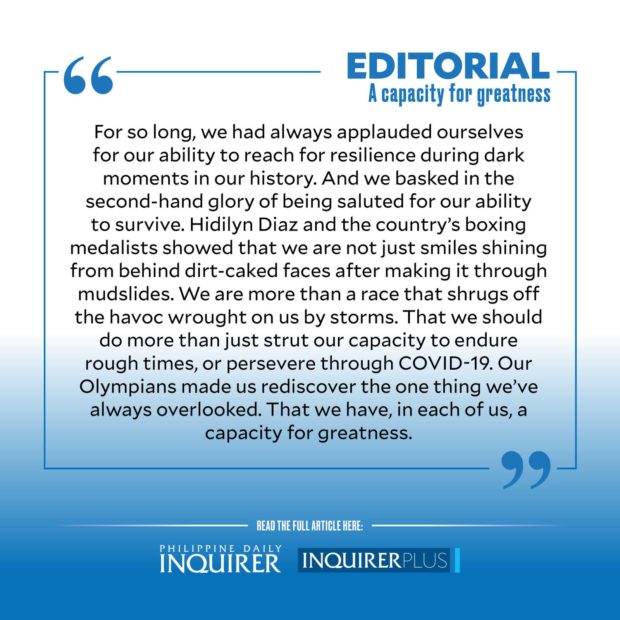A capacity for greatness
In an Olympic Games robbed of live spectators, one was left to listen to the roars in the mind as Hidilyn Diaz completed that one lift for her moment of glory. It would have been more special if Diaz’s triumphant tears were met with more than the sparse cheers from her fellow Filipino delegates to Tokyo.
But perhaps it was the absence of fans—a consequence of a ruthless pandemic that has yet to be tamed—that filled Team Philippines’ victories with meaning, even if that meaning was misconstrued sometimes.
Article continues after this advertisementCarlo Paalam, rather than stare at empty seats at the Kokugikan Arena while standing at the second step of the podium, pondered intently the silver medal around his neck, finding a symbolism in a prize crafted out of discarded gadgets. Somehow, Paalam felt like the shiny disc represented who he was—a scavenger who dug his way out of society’s landfill, now basking in the magnitude of his accomplishment.
“I came from scavengers, selling garbage scraps,” Paalam said in Filipino. “[This medal] symbolizes my life because this came from broken gadgets… and it has a connection to my life.”
It was a poignant note, but it wasn’t only Paalam’s humanity that was scrubbed clean and polished; it was ours, too. This was what Diaz—and by extension Paalam, Nesthy Petecio, and Eumir Marcial—allowed us to do: recycle our self-definition into something greater than the sum of our discarded parts.
Article continues after this advertisement“This proves we can do it,” Diaz told journalists at Tokyo International Forum. “They said this was impossible. I thought this was impossible. But the Filipino can do it. We just have to believe.”
Through our Olympians, we rediscovered bits and pieces of our Filipino-ness that we had forgotten about, those drowned in the murky cesspool of politics or ripped apart by the divisiveness—real or trolled—spewing from a toxic social media environment.
For so long, we had always applauded ourselves for our ability to reach for resilience during dark moments in our history. And we basked in the second-hand glory of being saluted for our ability to survive.
Not that it is wrong. But Diaz set out to prove that we deserved more. We meant more.
With two Olympic records and a gold medal that ended a 97-year wait, she crushed the belief that surviving is what we do best, that resilience is our finest trait, that when we are torn apart, the best we can do is assemble the pieces of our still diminished selves.
Even a medal-less EJ Obiena also shattered stereotypes, refusing to meekly accept things as they were and instead respectfully arguing his right to exit the final on his own terms.
“Us Filipinos, we’re very timid, we’re very ‘yes po, yes po, yes po,’” said Obiena after winning a protest that allowed him to take a re-jump. “Sometimes, we should say ‘wait lang po, pwedeng ganun; wait lang po, may idea ako; or wait lang po, ito ang tingin kong tama.’ I believe everybody should do it.”
The ringing message Diaz and Obiena sent out was doubled down by Paalam, Petecio, and Marcial, who refused to be content with being guaranteed medals and instead pushed hard to make sure they could take home the brightest color.
You could feel self-belief bloom within the delegation. Immediately after Paalam and Petecio booked final slots, no one believed they would settle for silver. The Olympic gold, long a distant dream, suddenly became a birthright. And the agony of their close defeats—despite losing fairly—burned as badly as when the country believed that Onyok Velasco was cheated out of the gold in 1996 in Atlanta.
Nobody could fault their efforts. Petecio made hometown bet Sena Irie work hard for her gold, so hard that Irie celebrated wildly on the ring after the decision was announced.
And Paalam: The 23-year-old flyweight came closer to the gold than people realize. A careful scrutiny of the judges’ scorecards after the match showed that had it not been for that one knockdown in the first round, the Cagayan de Oro-born fighter would have won the gold over Great Britain’s Galal Yafai.
None of the three boxers believed they were worth just the colors of the medals they took home. And all three of them vowed to prove themselves golden three years from now, when Paris hosts the 2024 Games.
Because this is what the Diaz gold and the boxing medals truly meant. And this is why the Tokyo Olympics, with its arenas padlocked by a pandemic, was the perfect time for the country to finally win an Olympic title.
Diaz and the country’s boxing medalists showed that we are not just smiles shining from behind dirt-caked faces after making it through mudslides. We are more than a race that shrugs off the havoc wrought on us by storms. That we should do more than just strut our capacity to endure rough times, or persevere through COVID-19.
Our Olympians made us rediscover the one thing we’ve always overlooked.
That we have, in each of us, a capacity for greatness.

















